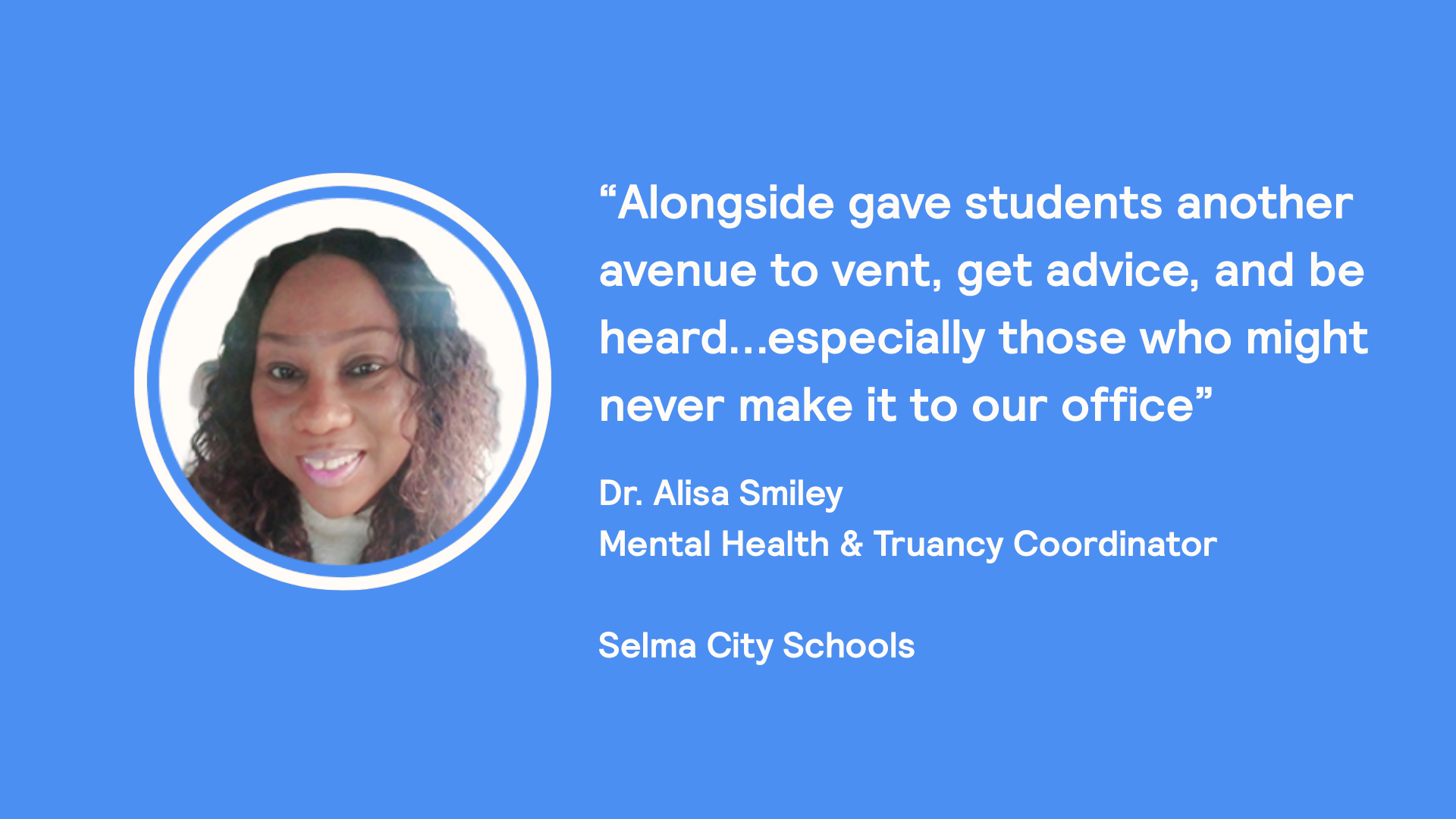

Cumberland County Schools in Fayetteville, North Carolina recently adopted the Alongside app for 26,000 students in grades 6-12. The district, home to a large population of transient students, many of whom are part of military families, invested in the app to provide consistent mental health support regardless of where students are. For many students, Alongside has become a valuable resource during difficult times.
SEE ALSO: Kiwi is Billboard Famous in Cumberland County
Jessica Fikes, a student in the district, leaned on the app when her grandmother was experiencing health issues. “There are times when I felt I wasn’t doing enough, where I felt like I wasn’t being the best I could be, and that led me to having several panic attacks,” Fikes said. “But the app has definitely helped keep those under control. My feelings have been less aggressive, and I’ve definitely felt a lot better since using the app.”
Supplementing Traditional Mental Health Support
Dr. Natasha Scott, Director of Student Services for Cumberland County Schools, emphasizes that Alongside is designed to complement, not replace, traditional mental health services. “We don't think of Alongside as a first line of defense,” Dr. Scott explained. “It is not a replacement for the human connection provided by our counselors, social workers, psychologists, teachers, and liaisons. We see it as a supplement.”
In a district where some students may be hesitant to engage in face-to-face conversations, Alongside provides an alternative. Dr. Scott pointed out that many students turn to social media platforms like TikTok and Instagram for advice, often encountering misinformation. Alongside offers a safer and more supportive option.
“The title of the app was important,” she said. “It works alongside the school staff and not in lieu of the human connection. It is not the first line of defense. The premier professionals who work in Cumberland County Schools as counselors and social workers are still the primary support.”
Dr. Scott also appreciates how the app offers support outside of regular school hours. “I like the fact that it's available on the weekend, in the evening, and during the summertime,” she added. This accessibility ensures students can access help whenever they need it, even when traditional resources are unavailable.
Leveraging Data to Understand Student Needs
One of the standout features of Alongside for Cumberland County Schools is its data dashboard, which provides valuable insights into student needs and interests. “There's a lot you can learn about your students in terms of what they consider to be their needs and what they find most interesting,” Dr. Scott said. This data-driven approach aligns with the district’s focus on Multi-Tiered System of Supports (MTSS) and ensures a continuum of care, particularly given the shortage of mental health personnel.
“We've struggled to find an SEL program that high school students would appreciate, but Alongside provides an SEL learning opportunity in a format that kids like.”
Alongside's ability to support social-emotional learning (SEL) in a format that resonates with high school students is another key advantage. “We've struggled to find an SEL program that high school students would appreciate,” Dr. Scott admitted. “But Alongside provides an SEL learning opportunity in a format that kids like.” The app empowers students to develop coping skills and create action plans on their own, promoting a sense of agency and self-reliance.
Dr. Scott highlighted how the app also supports teaching soft skills and self-regulation, essential for future success. “Alongside does a great job of fostering these skills in students,” she said. “It aligns with many of the goals we have in our district, reinforcing important life skills that contribute to both academic and personal growth.”
A Rigorous Evaluation Process
Before rolling out Alongside, Dr. Scott and her team conducted a thorough evaluation. The team, which included coordinators from social work, counseling, and site services, as well as military liaisons, put the app through its paces. “We approached the evaluation by asking hard questions and testing the app ourselves, simulating the types of inquiries and concerns that students might have,” Dr. Scott explained.
The team pretended to be students, asking challenging questions to assess the AI's responses. They also applied a “golden rule” approach, asking whether the responses would be acceptable if they were in the students’ shoes.
Dr. Scott noted that the demo feature on Alongside’s website was particularly helpful, allowing them to test the app up to three times. This comprehensive evaluation process involved principals from elementary, middle, and high schools, ensuring a well-rounded perspective.
The rigorous evaluation confirmed that Alongside met the district’s high standards, providing a reliable tool for student support. “This process gave us confidence in the app's ability to meet our students' needs,” Dr. Scott concluded.
Conclusion
Alongside has proven to be a valuable addition to Cumberland County Schools’ mental health resources, particularly for students who may not feel comfortable seeking help through traditional channels. By supplementing existing services and providing support outside of regular school hours, the app offers a flexible and effective solution to meet the needs of a diverse student population. As the district continues to leverage the app’s data insights and SEL capabilities, Cumberland County Schools remains committed to fostering student wellness and preparing students for success both in school and beyond.



